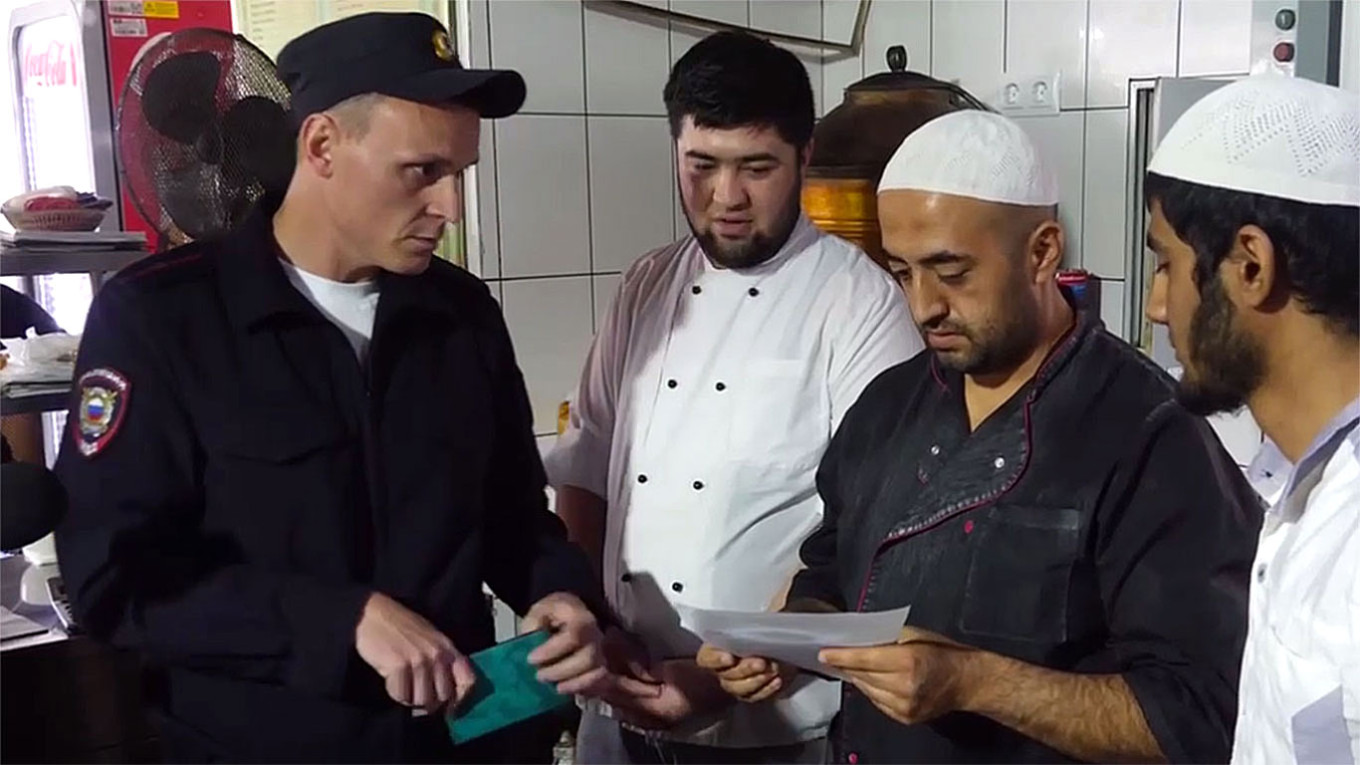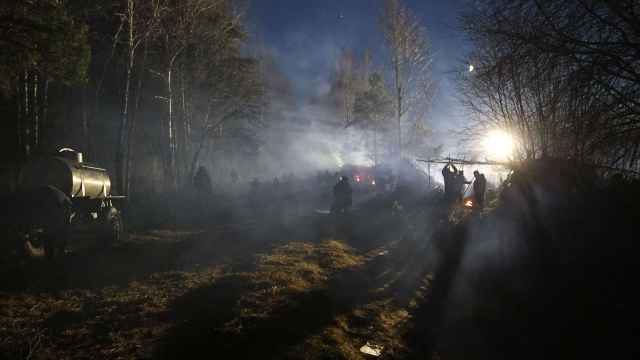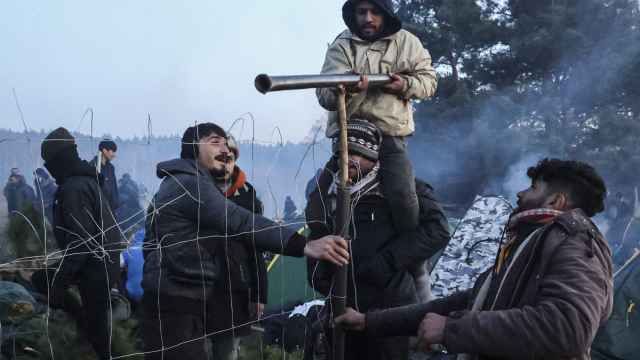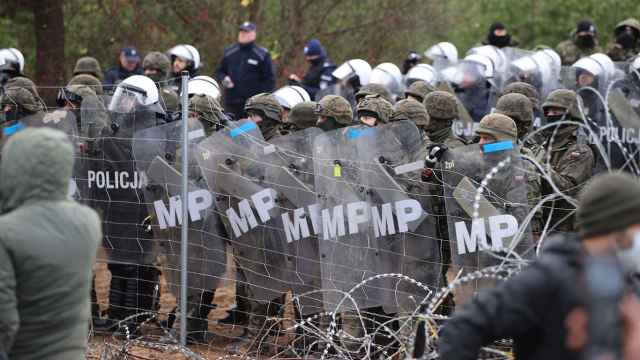Hundreds of migrant workers hailing predominantly from Central Asia have been rounded up in a wave of police raids that has swept several Russian cities in recent weeks.
The round-ups appear to primarily target male migrants who recently received Russian citizenship but failed to complete their compulsory military registration. Some are handed military summons on the spot, while others are forcibly taken to military enlistment offices, according to local media reports.
While the raids are hardly new, experts told The Moscow Times that they are increasingly a part of Russia’s efforts to use migrant workers to bolster its manpower in Ukraine.
When combined with a number of other factors, including the country's wartime economic downturn, they risk deterring a growing number of migrant laborers from taking up jobs in Russia.
“Russia is used to making big things happen by using migrant workers. Take, for example, the Sochi Olympics or the FIFA World Cup, where most infrastructure was built by migrants,” said Temur Umarov, an analyst at the Carnegie Endowment for International Peace. “The war in Ukraine isn’t an exception.”
Russia’s economy has long been reliant on the labor of migrant workers who take on an array of vital but lower-paying jobs, including construction workers, fruit sellers, vendors and street cleaners.
The biggest outflow of migrants from Russia happened during the Covid-19 pandemic when about 5 million workers — or about half of the migrant workforce — left the country.
Following a brief rebound in 2021, Russia experienced a fresh wave of labor outflow with the start of the war in Ukraine and subsequent Western sanctions.
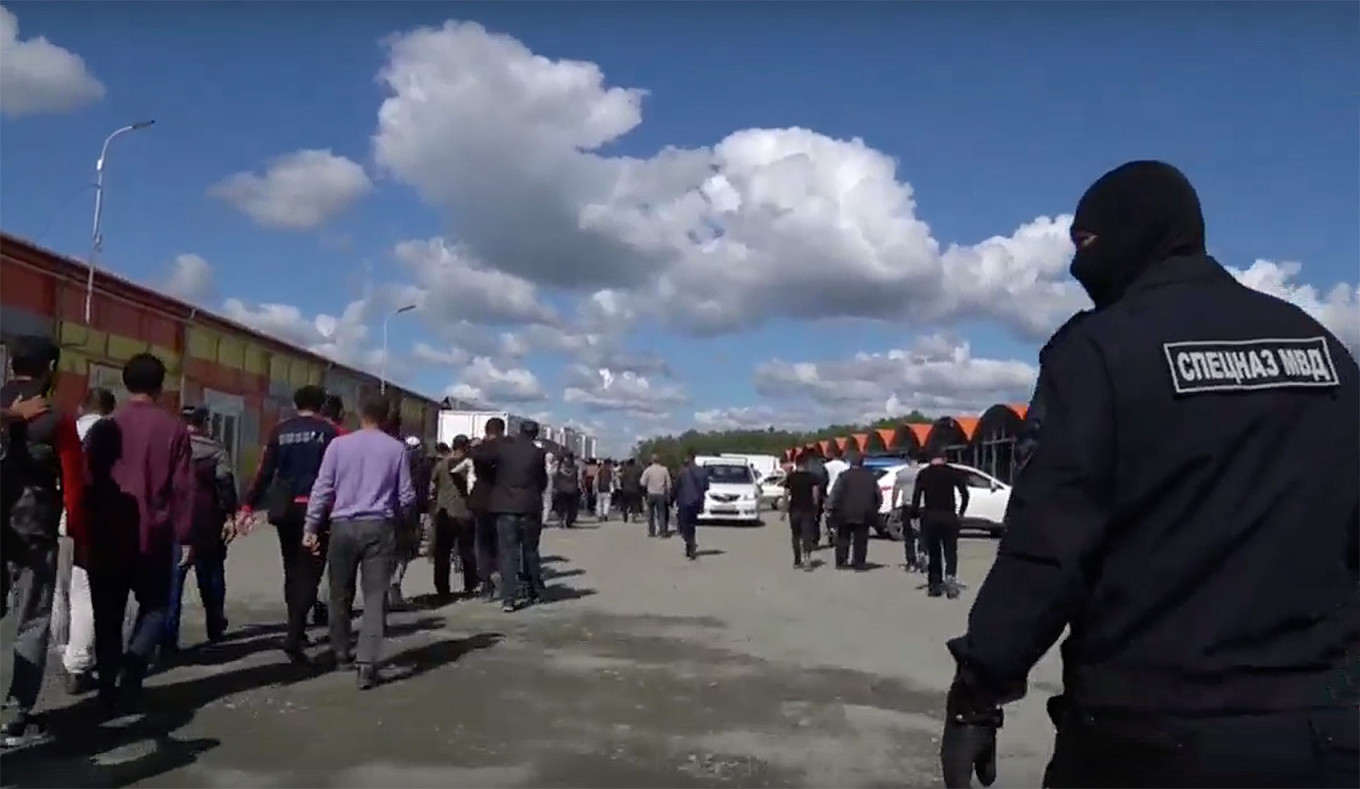
Just 4 million migrants came to Russia to work in 2022, according to government statistics. Though the inflow of workers increased in the first quarter of 2023 compared to the same period last year, the significant dip in the Russian ruble over the past month could exacerbate a slow but steady decrease in arrivals.
“Taking into account…how difficult it became to send money back home and the fact that it's not the same amount of money as it was before, the decrease in the number of migrants is inevitable,” said Umarov.
Migrant workers in Russia — a large portion of whom come from Kyrgyzstan, Tajikistan, Uzbekistan and Armenia — already report having to take on additional jobs and work 15-hour days to adjust for the changing exchange rate between the ruble and their home currencies.
But the possibility of being sent to the battlefield in Ukraine poses a more immediate threat than a sluggish economy.
Male migrants who receive Russian citizenship — often in the hope of improving their economic prospects — are required by law to register with the Russian military and can be called up to serve in the army during mobilization.
But they are not the only ones being targeted in the recent raids.
“It is not only Russian citizens who are being added to the military register; they attempt to force everyone brought [to a police department following a raid] to sign a military contract,” said Valentina Chupik, a human rights lawyer and the founder of Tong Zhakhoni, an NGO offering legal assistance to migrants in Russia.
Chupik said she receives thousands of requests each month for advice and legal assistance from migrant laborers working in Russia.
Contrary to what the volume of media reports might suggest, the number of monthly appeals received by Chupik and her colleagues peaked in April with 5,820 people asking for assistance against an estimated total of 3,500 in August.
“I can’t say that the requests are particularly horrific right now…way more beatings [of migrant workers by the police] took place in February and then in April this year,” Chupik explained.
Many of the pleas Chupik receives are from people who say they have been forced to sign a contract with the Defense Ministry upon detention by the police or during a routine visit to a migration center.
“These are mass requests…the pressure [on migrants] is enormous,” Chupik said in a phone interview with The Moscow Times.
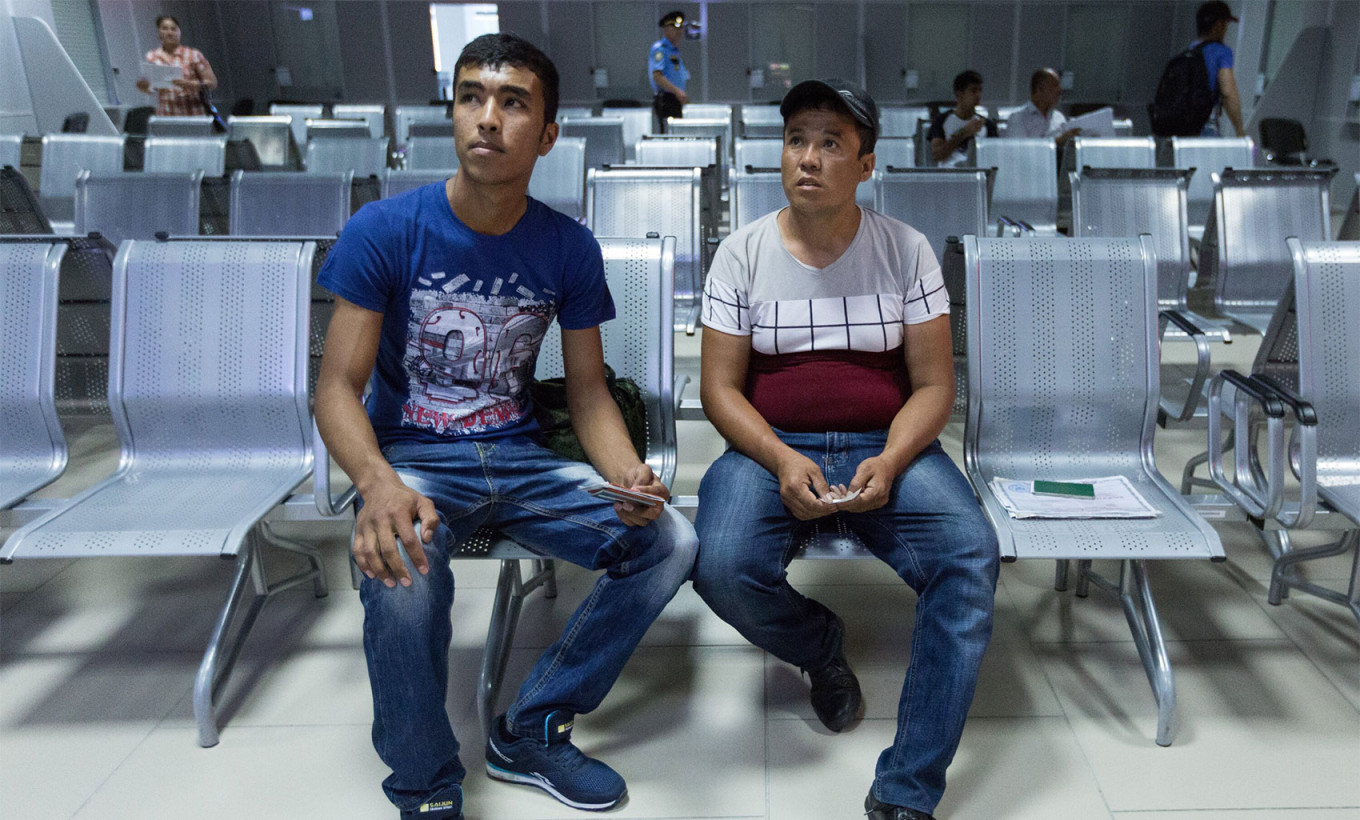
While some detainees, according to Chupik, report being denied the chance to read a document handed to them before signing, others say they were tricked into signing unmarked or partially concealed pieces of paper which, in fact, were part of a legally binding agreement.
“These actions are illegal even based on the sole fact that an identity check is not a lawful reason for arrest,” Chupik explained, noting that Russian police also have no legal right to review migration documents upon detention or use the review as a pretext for bringing a person to a police station, let alone a military enlistment office.
Chupik said she and her colleagues have had a 100% success rate in helping their clients avoid being sent to Ukraine, but not everyone is as lucky.
At least 93 citizens of Central Asian countries — including 19 from Kyrgyzstan, 34 from Uzbekistan and 40 from Tajikistan — have been killed fighting for Russia in Ukraine, according to the BBC Russian service. But because Russia carefully conceals the number and demographics of its forces fighting and being killed in Ukraine, the real number could be much higher.
Some of these men fought in the ranks of the Russian Armed Forces — joining either voluntarily or by trickery — while others were recruited from prisons by the Wagner mercenary group to fight in Ukraine in exchange for a pardon.
Hundreds of migrants from Central Asia have also been recruited to work in the Russian-occupied territories of Ukraine, according to investigations by independent Kyrgyz news outlet Kloop and Radio Azattyk, the Kyrgyzstan-based affiliate of the U.S.-funded RFE/RL.
Meanwhile, migrants inside Russia are often used as political pawns.
With regional elections starting Friday and Putin’s widely expected re-election coming up in March next year, officials appear ready to appeal to racist and migrant-phobic sentiments to improve their political standing.
In July, State Duma deputy Sergei Mironov, the head of the conservative A Just Russia party, called on Russian authorities to introduce additional obstacles for migrants seeking Russian citizenship.
To back his argument, Mironov cited Interior Ministry statistics that showed a 6.3% increase in the number of crimes committed by migrants in the first half of 2023 compared to the latter half of 2022, though failing to mention that crimes committed by foreign nationals comprise at most a couple percent of all those registered in Russia.
“Many ethnic Russians spend years trying to get citizenship and people who don’t know the language can get it within months or even days. We are demanding a large-scale inspection of the Migration Service,” said Mironov.
The wave of raids that swept the country last month, too, is an attempt to demonstrate the government’s apparent effectiveness in combating crime and illegal migration as officials across the regions report busting drug users and deporting undocumented workers following the raids.
“They paint migrants as an external enemy inside the country that people need to unite against and forget about all other problems that exist in Russia,” said analyst Umarov.
Human rights defender Chupik said that the recent raids have not been conducted by the authorities alone but were aided by Russian neo-Nazi groups such as The Slavic Union, which allegedly has the unofficial backing of the state police forces and consists, among others, of former policemen fired for breaking the law.
With top officials not shying away from using openly nationalist rhetoric to fuel wartime patriotism, the recent raids could signal the beginning of darker times for migrant workers in Russia who have already faced significant discrimination.
“Nazism and migrant-phobia are being aggravated,” said Chupik.
A Message from The Moscow Times:
Dear readers,
We are facing unprecedented challenges. Russia's Prosecutor General's Office has designated The Moscow Times as an "undesirable" organization, criminalizing our work and putting our staff at risk of prosecution. This follows our earlier unjust labeling as a "foreign agent."
These actions are direct attempts to silence independent journalism in Russia. The authorities claim our work "discredits the decisions of the Russian leadership." We see things differently: we strive to provide accurate, unbiased reporting on Russia.
We, the journalists of The Moscow Times, refuse to be silenced. But to continue our work, we need your help.
Your support, no matter how small, makes a world of difference. If you can, please support us monthly starting from just $2. It's quick to set up, and every contribution makes a significant impact.
By supporting The Moscow Times, you're defending open, independent journalism in the face of repression. Thank you for standing with us.
Remind me later.



